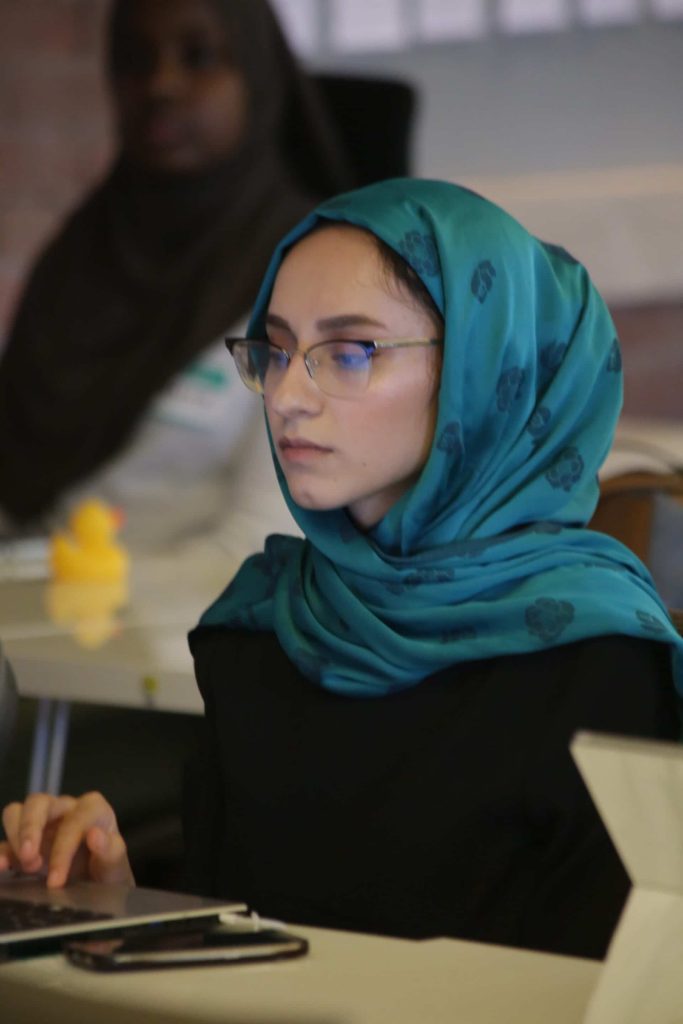The World Economic Forum projects that by 2022, 60% of the global GDP will come from digital services. In an ever-digitizing world, we must think about what individuals are left out of the narrative due to issues of access and discrimination. As this week marks Digital Inclusion Week, we at IDRF, look towards our Women in Tech program that allows women access to building digital literacy.
IDRF’s commitment to digital inclusion cannot be stated in numbers alone; it is the women who are the true champions of these programs. Through the generous support of the United Way Greater Toronto, we are able to provide the Introduction and the Web Development Bootcamp for free. Past graduates now work as Full Stack Developers and also serve as the teachers for future participants. By becoming teachers, the program also allows these women to become positive role models and be taught by people who look and sound like them.
To truly understand the impact of these programs, we turn to the story of Saba Zubair. Originally, she was confused on what career path she wanted as she attended University of Toronto as an undecided student and eventually ended up specializing in Human Resource Management at Ryerson. Her interest in coding was peaked through an internship in Human Resources at Lighthouse Labs. She stated why she previously found digital literacy inaccessible as she said “I know one of the only reasons why I didn’t consider computer science was because…in my head, this was for math, men, and people who like games”. Since the program costs are covered, she was able to leave her job at Lighthouse Labs and take part in the Women Learning to Code bootcamp. She was encouraged by the large number of female developers in the bootcamp and took on mentoring second year participants of the Introductory Course to encourage other people in their academic pursuits. A couple of weeks after the program was completed, she secured a job as a Fullstack developer at Postageapp. She also provided feedback on how to improve the curriculum to better prepare students for the bootcamp. She went on to win the RBC Future Launch Scholarship to improve her front and back-end programming. In the future, her goal is to be a software engineer in an organization that lets her further develop her skills.
Another woman whose life was transformed by the Women in Tech program is Nazia Shaik. A mother who grew up in a traditional household that did not prioritize female independence, she wanted her daughter to have a positive female role model. Nazia had a Bachelor’s degree in Design and she began working as a visual designer and then went on to become UX Designer and UI Developer. She then relocated to the US and became a freelance UX Designer and UI Developer. Eventually, she moved to Canada and began working as a Design Technologist. Through her time as a freelance designer, she became interested in coding as she was surrounded by people who code. In 2018, she came across IDRF’s website and felt the program would be a good fit for her. She then took part in the Introduction to Web Development course and returned to her old job when she was done. A year after completion, she was offered a scholarship to take part in the Women Learning to Code and Take Leadership Program. Despite the difficulties of studying virtually while taking care of kids, she was able to complete the program and secure a job as a Web Developer at Lighthouse Labs. She has also started teaching her five-year-old daughter the basics of coding already.
The Women in Tech program is the first step to tackling a digital divide and ensuring women are able to work in the tech sector. 2021 marks the fourth year of our Women in Tech program which provides access to digital literacy skills for young women aged 18-29 in the Greater Toronto Area. The program participants are women and the program starts in August with the introduction to web development course. The past participants have had a 100% full-time employment rate. Breaking down these barriers will allow women, especially women of colour, access to higher paying jobs and future career development. We, here at IDRF, are committed to addressing digital inclusion barriers and encouraging more women to take part in the tech sector. We look forward to helping more women discover their passion for coding and feel free to explore any career interests regardless of how male-dominated of a sector.


